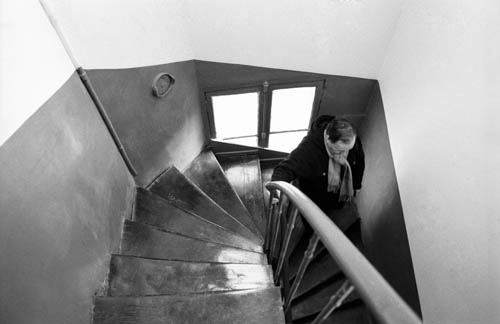This post is also available in:
 French
French
For two years, I lived in the company of men and women who had just moved into permanent accommodation, after a long period of living in the street. How did they adapt to their new lives? How did they go about rebuilding themselves? What daily routine did they find? That’s what I wanted to find out.
Quickly I found the limits of photography. They all expressed their relief at having found accommodation, but also the difficulties they had in getting used to living in a confined space and the difficulties they experienced in taking care of themselves day-to-day. These sentiments were impossible to represent through photography, so I noted down everything they said in a small notebook. I reproduced their style, their way of speaking, their errors, taboos and contradictions. No brutally direct interview, but a succession of intimate exchanges and reflections that they confided to me over time.
All of the people I frequented are more than fifty years old. They all had a difficult childhood. Most rejected their families or were rejected by their families. Many are worn out, ill, depressive, under treatment or chemically dependent. Most feel of no use to the world, have closed in on themselves and have withdrawn from social life. Some talk of their loneliness, their suffering, the impossibility to have any social exchange, to chat or share their emotions. Many feel guilty and think that their exclusion is their own fault. All live on social welfare. Some have modest retirement payments and several suffer from severe dependence on alcohol.
Having a roof – even if it is a hovel – is primordial for them. They all spoke of their desire to settle, to have an address, a bed, keys, a letter box…simply to be recognized, despite their poverty. For me, the hardest thing was to manage to follow several people simultaneously. I needed to be perfectly organized in order to maintain a degree of pressure, without disrupting their daily routine. I had to manage no-shows for meetings, changes of address, admittances to hospital, people going back to living in the street, and all sorts of schemes to avoid unscrupulous landlords upset by my presence.
I set up my headquarters at « l’Etape », a place belonging to the petits frères des Pauvres which welcomes homeless people. Generally I arrived at breakfast-time, and chatted with those present, talking to them about my project. Many refused to take part. Afraid to show themselves, to speak or to be recognized by their families. It took a huge amount of time, of listening and of physical presence to win their trust. Initially I gave them the photos, but I quickly gave up because it gave them an image of themselves that they refused to see. Finally I didn’t take that many photos at all. We met regularly, for a coffee, just chatting. I felt more like a volunteer than a photographer and liked that.
Today, like every time I finish a big project, I ask myself if the final result is as rich as what I actually experienced. Have I shown myself worthy of the trust they had in me? Did I get to the heart of the matter? Does what I have shown, or have not shown, accurately reflect the subject ? I know that one needs much more than photos so to free these fragile people of the heavy load of prejudice and taboo that lead them to being lost to general indifference.
Makou, Ginette, Daniel, Max, Patrick and all of you with whom I have spent these memorable times, the result of this work belongs as much to you as to me. May your words and my images inspire compassion amongst those who see them, and give them the desire simply to get to know you better. That is my dearest wish.
Jean-Louis Courtinat
From 16/01/2013 to 23/02/2013
Galerie FAIT & CAUSE
58 rue Quincampoix
75004 PARIS
France
Opening hours : Du mardi au samedi de 13h30 à 18h30
Phone : 01 42 74 26 36
malika.barache@pqev.org
www.sophot.com



